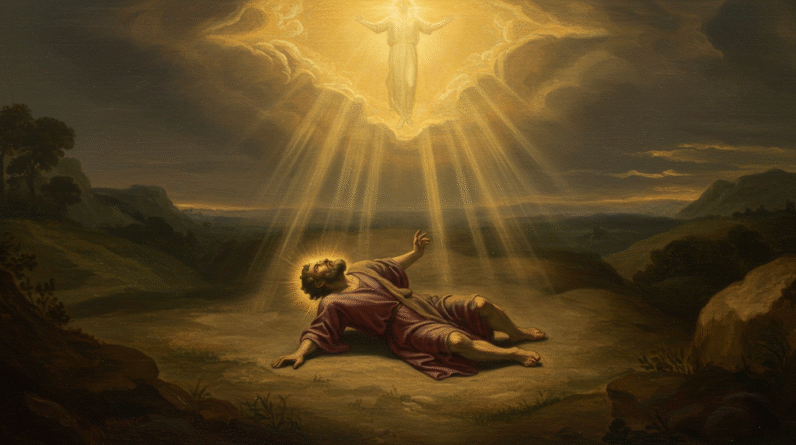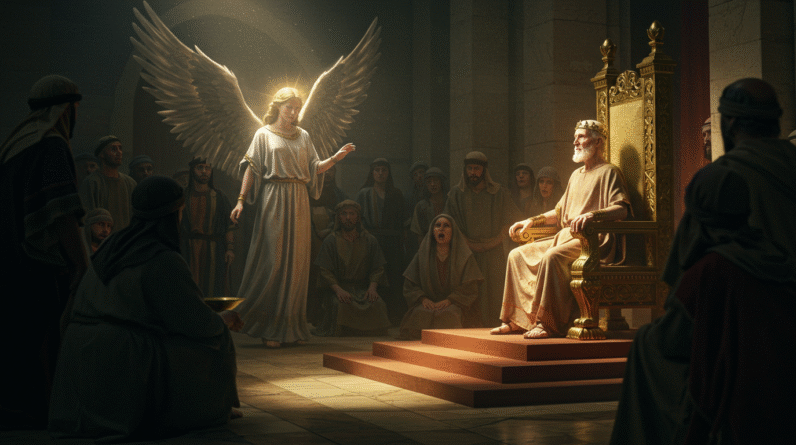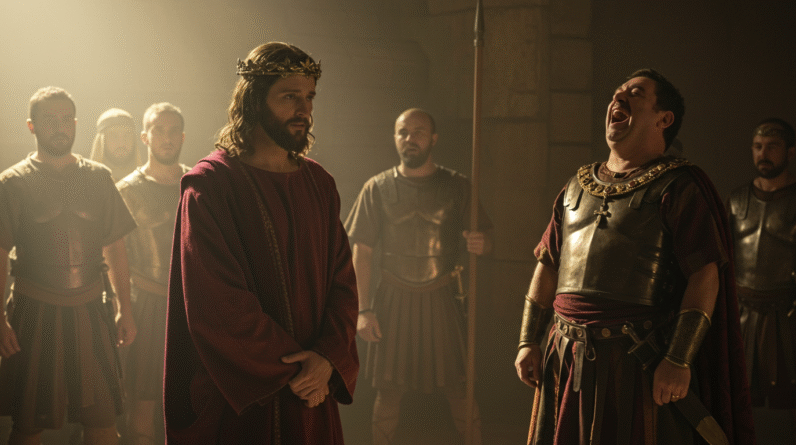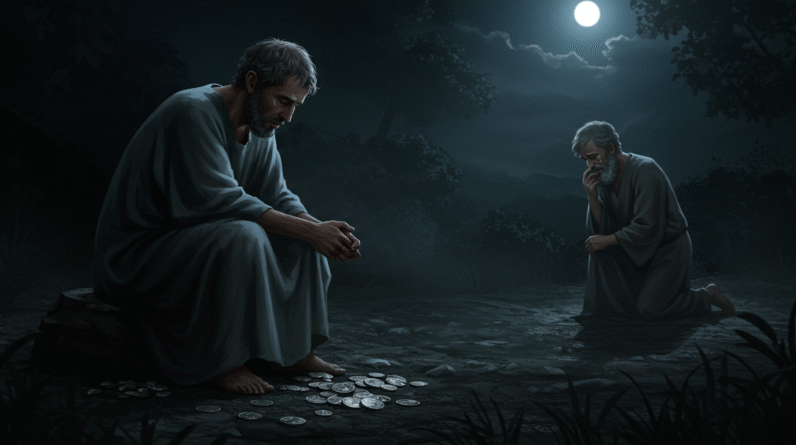The Massacre of the Innocents: Herod’s Darkest Act
Herod’s Decree
When you think of a king, you might envision someone wise, just, and benevolent. Yet, if you look into the history books and delve into the life of King Herod, you’ll paint a very different picture. Herod the Great, a ruler infamous for his tyrannical reign, committed numerous heinous acts. However, none stand out so chillingly as Herod’s massacre, also known as the Massacre of the Innocents. You might wonder what drove Herod to commit such an atrocious act. Interestingly, the seeds of his paranoia were rooted in a blend of political insecurity and spiritual prophecy.
Herod was deeply threatened by the birth of Jesus, as news of the prophesied “King of the Jews” reached his ears. This new king, heralded by the Magi, stirred fear in Herod. In a ruthless attempt to eliminate this perceived threat to his throne, he ordered the slaughter of all male babies two years old and under in Bethlehem and its vicinity, thus committing one of antiquity’s darkest deeds. Matthew 2:16 describes how Herod, realizing that the wise men deceived him, was infuriated and gave this horrific command.
Prophetic Significance
Why would a king feel so endangered by the promise of a child? The answer lies in prophecies dating long before Herod’s reign. For many, Herod’s massacre wasn’t just an unspeakable act of brutality but a dark shadow in the tapestry of divine prophecy.
In the New Testament, Matthew speaks of the prophetic words of Jeremiah: “A voice is heard in Ramah, weeping and great mourning, Rachel weeping for her children and refusing to be comforted because they are no more” (Matthew 2:18). This prophecy, uttered hundreds of years earlier, highlighted the grief of a nation losing its future — Herod’s massacre merely fulfilled what was written.
The act wasn’t only a demonstration of Herod’s cruelty but a pivot in the world’s understanding of divine prophecy. Jesus’ escape to Egypt symbolized the enduring divine protection amidst tyrannical evil. As you ponder this, imagine how it would feel to live with the tension of prophecies fulfilled through such tragic circumstances.
Spiritual Lessons on Evil
Herod’s massacre invites you to reflect on the nature of evil in the world. It’s unsettling to realize how fear and insecurity can drive people to unspeakable acts. In a broader sense, it challenges you to consider the spiritual battle between good and evil. How often do we see power corrupt, leading individuals and nations to commit acts of violence against the innocent?
Despite the heinousness of Herod’s actions, the narrative doesn’t end with murder; rather, it shines a light on resilience and the eventual triumph of good over evil. The escape of Jesus to Egypt stands as a testament to God’s protective hand over His plans and people. Matthew 2:14-15 shows Joseph’s obedience to divine direction, protecting Jesus from harm.
This part of the story embodies hope and divine protection, reminding us that evil, though seemingly powerful, does not hold the ultimate power.
Divine Protection amid Despair
If you find yourself grappling with despair, the account of Herod’s massacre provides a lens through which to view divine safeguarding amidst calamity. Imagine being in Bethlehem, witnessing the unspeakable atrocity, and yet understanding there was a grander scheme at play beyond immediate comprehension.
The escape to Egypt is not just a narrative of survival but of providence. The account gives assurance that even when evil seems to prevail, protection and redemption are not far behind. Take solace in knowing that divine intervention doesn’t promise an absence of tribulation, but offers a path through it.
You learn that God’s plans are undefeatable, reflected in how Jesus’ life continued despite Herod’s attempt to terminate it. Reflect on how often in your life the greatest threats also bring about divine opportunities. These biblical lessons call you to trust in divine protection, even when evil casts a long shadow.
Herod’s Paranoia
You might wonder why a successful ruler would be so consumed by fear. Herod’s massacre can be glimpsed as a tragic result of his paranoia. His insecurity was fueled by a lust for power, a fixation on control that slipped through his fingers at the first whisper of another king’s birth.
Herod wasn’t just concerned with maintaining his throne; he believed he was curbing godly prophecy, thereby pushing against divine truth. His perception of a budding messianic hope as a direct threat compelled him to undertake barbaric measures, believing this would cement his place in history as an unmovable king. However, the cruel irony is that Herod’s name is etched into history not as a great ruler, but as one of the most despicable figures due to Herod’s massacre.
Herod’s darkest act serves as a warning against letting fear dominate one’s decisions. Reflect on this in your own context — what fears drive your choices, and are you allowing insecurity to cloud your judgment?
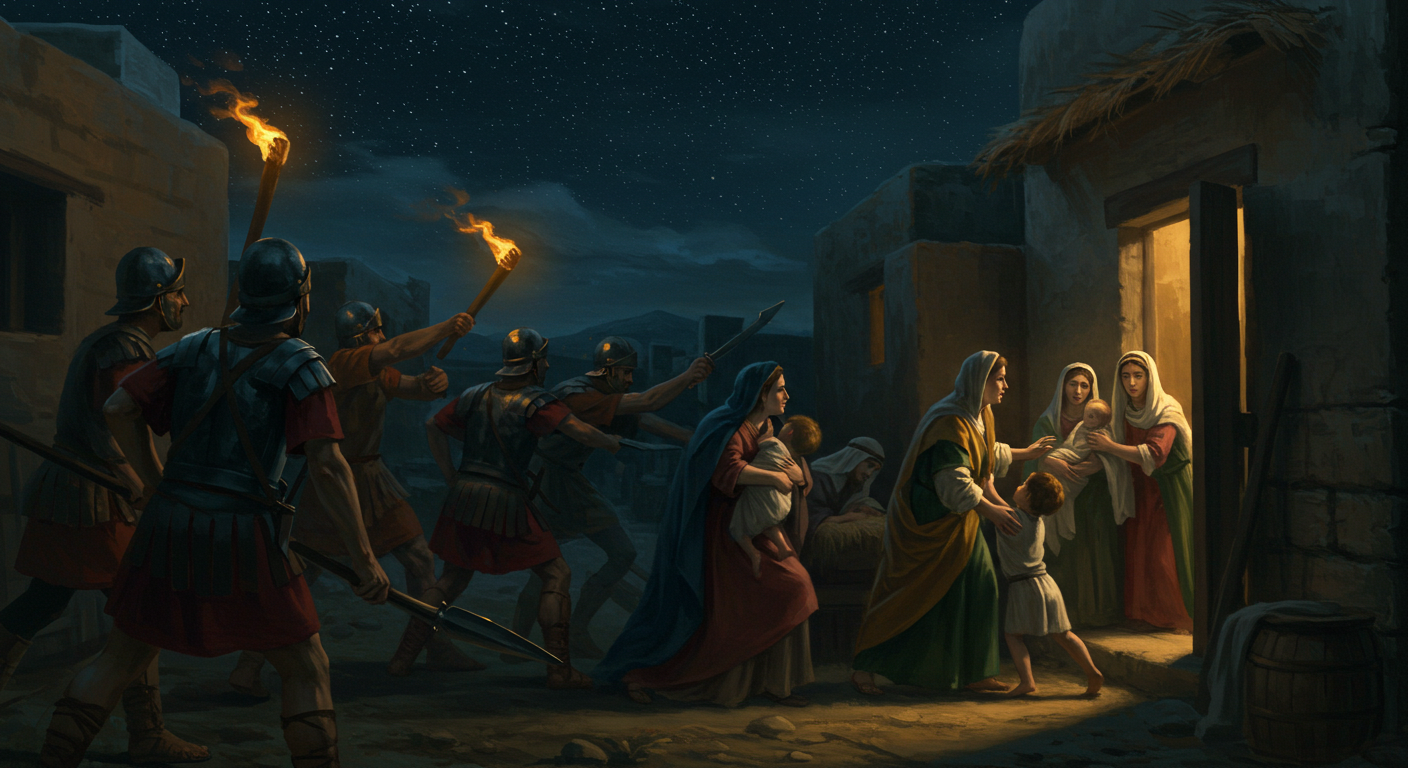
The Resilience of Bethlehem
Although obscured by the villainy of Herod’s massacre, the resilience of Bethlehem’s people also emerges from this disheartening narrative. Imagine a community ravaged by unspeakable loss, yet pushing through adversity with unwavering faith.
The event highlights the indomitable spirit within individuals and communities alike. Despite the crisis, the story of Bethlehem is not one rooted solely in suffering, but in rebuilding faith and community after devastation.
Ponder this as you grapple with your challenges — how can the heart and faith of these ancient people inspire your response to adversity? As you reach for resilience, let this narrative remind you: even amidst overwhelming darkness, steadfast hope serves as a guiding star.
Cultural Impact Over the Centuries
Herod’s massacre echoes through time, contemplated in theology, art, and literature. This particular event resonates not just for its brutality but as a symbol of innocence lost and an era marked by fear-driven actions.
From medieval songs to Baroque paintings, creative minds have sought to express the sorrow and gravity of Herod’s massacre. Consider how these artistic interpretations offered solace, keeping alive the narrative of divine protection through generations. These cultural artifacts provided empathy, serving as conduits for grief and healing across centuries.
It’s fascinating to realize how an event so long past affects even modern perspectives on leadership, morality, and the power dynamics of fear. You might see how these ancient lessons continue to influence societal values and ethical discussions today.
Modern Reflections on Ancient Events
Though Herod’s massacre happened over two millennia ago, its moral and spiritual lessons remain relatable to your modern life. When you see instances of power exerting itself over the vulnerable, parallels with Herod’s dark history emerge.
This narrative pushes you to question authority, holding those in power accountable. You learn to recognize the signs of oppressive regimes and understand that unchecked power often leads to tragic outcomes. In reflecting on Herod’s actions, you also discern the critical importance of nurturing a society that values life and justice.
For you today, this isn’t just a historical account but a constant reminder of your role in advocating for the protection of every innocent life, ensuring history doesn’t repeat itself in your world.
Conclusion
In examining Herod’s massacre, you delve into a tale both unsettling and profound. The historical record paints Herod as a despotic ruler whose fear of being overthrown led to horrific measures. Yet, entwined in this dark story are lessons of prophecy, divine protection, and an unyielding fight between good and evil that transcends time.
As you ponder Herod’s darkest act, consider how this ancient event provides space for reflection on contemporary issues of power, morality, and protection. Let the resilience of those ancient communities inspire you, and the narrative of divine protection impart hope as you navigate your challenges.
Explore More
For further reading and encouragement, check out these posts:
👉 7 Bible Verses About Faith in Hard Times
👉 Job’s Faith: What We Can Learn From His Trials
👉 How To Trust God When Everything Falls Apart
👉 Why God Allows Suffering – A Biblical Perspective
👉 Faith Over Fear: How To Stand Strong In Uncertain Seasons
👉 How To Encourage Someone Struggling With Their Faith
👉 5 Prayers for Strength When You’re Feeling Weak

📘 Jesus and the Woman Caught in Adultery – Grace and Mercy Over Judgement
A powerful retelling of John 8:1-11. This book brings to life the depth of forgiveness, mercy, and God’s unwavering love.
👉 Check it now on Amazon
As a ClickBank Affiliate, I earn from qualifying purchases.
Acknowledgment: All Bible verses referenced in this article were accessed via Bible Gateway (or Bible Hub).
“Want to explore more? Check out our latest post on Why Jesus? and discover the life-changing truth of the Gospel!”



